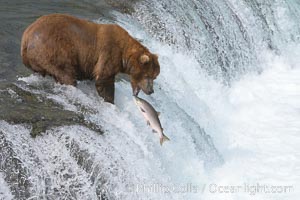
Alaskan brown bear catching a jumping salmon, Brooks Falls.
Species: Brown bear, Ursus arctos
Location: Brooks River, Katmai National Park, Alaska
Image ID: 17033
Species: Brown bear, Ursus arctos
Location: Brooks River, Katmai National Park, Alaska
Image ID: 17033
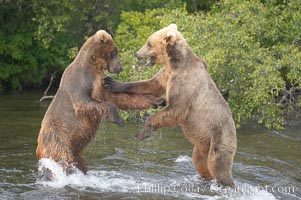
Two young brown bears mock fighting.
Species: Brown bear, Ursus arctos
Location: Brooks River, Katmai National Park, Alaska
Image ID: 17035
Species: Brown bear, Ursus arctos
Location: Brooks River, Katmai National Park, Alaska
Image ID: 17035
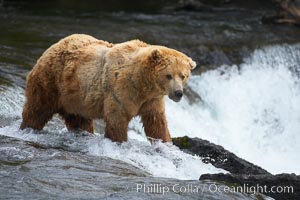
A large, old brown bear (grizzly bear) wades across Brooks River. Coastal and near-coastal brown bears in Alaska can live to 25 years of age, weigh up to 1400 lbs and stand over 9 feet tall.
Species: Brown bear, Ursus arctos
Location: Brooks River, Katmai National Park, Alaska
Image ID: 17038
Species: Brown bear, Ursus arctos
Location: Brooks River, Katmai National Park, Alaska
Image ID: 17038
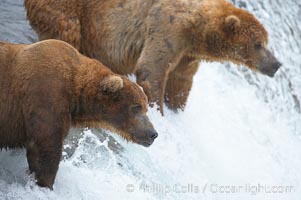
Brown bear (grizzly bear).
Species: Brown bear, Ursus arctos
Location: Brooks River, Katmai National Park, Alaska
Image ID: 17040
Species: Brown bear, Ursus arctos
Location: Brooks River, Katmai National Park, Alaska
Image ID: 17040
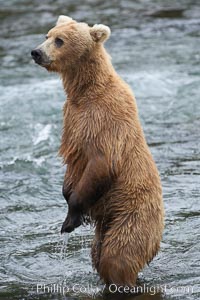
Brown bear (grizzly bear).
Species: Brown bear, Ursus arctos
Location: Brooks River, Katmai National Park, Alaska
Image ID: 17041
Species: Brown bear, Ursus arctos
Location: Brooks River, Katmai National Park, Alaska
Image ID: 17041
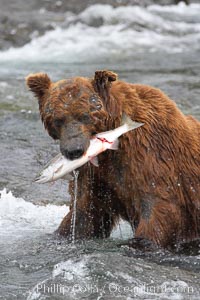
A brown bear eats a salmon it has caught in the Brooks River.
Species: Brown bear, Ursus arctos
Location: Brooks River, Katmai National Park, Alaska
Image ID: 17051
Species: Brown bear, Ursus arctos
Location: Brooks River, Katmai National Park, Alaska
Image ID: 17051
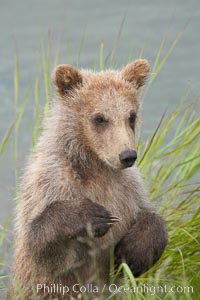
Brown bear spring cub, just a few months old.
Species: Brown bear, Ursus arctos
Location: Brooks River, Katmai National Park, Alaska
Image ID: 17056
Species: Brown bear, Ursus arctos
Location: Brooks River, Katmai National Park, Alaska
Image ID: 17056
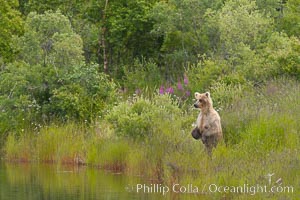
Brown bear walks through the marshes that skirt the Brooks River.
Species: Brown bear, Ursus arctos
Location: Brooks River, Katmai National Park, Alaska
Image ID: 17062
Species: Brown bear, Ursus arctos
Location: Brooks River, Katmai National Park, Alaska
Image ID: 17062
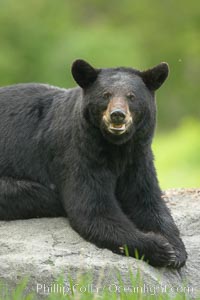
Black bear on granite rock. This bear still has its thick, full winter coat, which will be shed soon with the approach of summer.
Species: American black bear, Ursus americanus
Location: Orr, Minnesota
Image ID: 18750
Species: American black bear, Ursus americanus
Location: Orr, Minnesota
Image ID: 18750
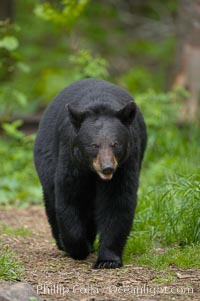
Black bear walking in a forest. Black bears can live 25 years or more, and range in color from deepest black to chocolate and cinnamon brown. Adult males typically weigh up to 600 pounds. Adult females weight up to 400 pounds and reach sexual maturity at 3 or 4 years of age. Adults stand about 3' tall at the shoulder.
Species: American black bear, Ursus americanus
Location: Orr, Minnesota
Image ID: 18751
Species: American black bear, Ursus americanus
Location: Orr, Minnesota
Image ID: 18751
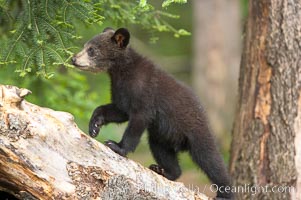
Black bear cub. Black bear cubs are typically born in January or February, weighing less than one pound at birth. Cubs are weaned between July and September and remain with their mother until the next winter.
Species: American black bear, Ursus americanus
Location: Orr, Minnesota
Image ID: 18752
Species: American black bear, Ursus americanus
Location: Orr, Minnesota
Image ID: 18752
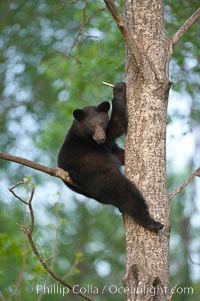
Black bear in a tree. Black bears are expert tree climbers and will ascend trees if they sense danger or the approach of larger bears, to seek a place to rest, or to get a view of their surroundings.
Species: American black bear, Ursus americanus
Location: Orr, Minnesota
Image ID: 18762
Species: American black bear, Ursus americanus
Location: Orr, Minnesota
Image ID: 18762
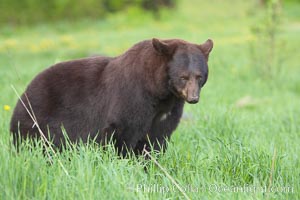
Black bear portrait sitting in long grass. This bear still has its thick, full winter coat, which will be shed soon with the approach of summer. Black bears are omnivores and will find several foods to their liking in meadows, including grasses, herbs, fruits, and insects.
Species: American black bear, Ursus americanus
Location: Orr, Minnesota
Image ID: 18763
Species: American black bear, Ursus americanus
Location: Orr, Minnesota
Image ID: 18763
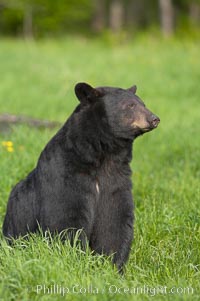
Black bear portrait sitting in long grass. This bear still has its thick, full winter coat, which will be shed soon with the approach of summer. Black bears are omnivores and will find several foods to their liking in meadows, including grasses, herbs, fruits, and insects.
Species: American black bear, Ursus americanus
Location: Orr, Minnesota
Image ID: 18764
Species: American black bear, Ursus americanus
Location: Orr, Minnesota
Image ID: 18764
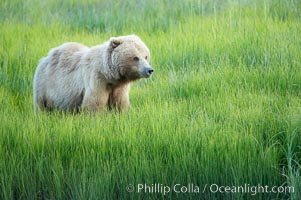
Coastal brown bear in meadow. The tall sedge grasses in this coastal meadow are a food source for brown bears, who may eat 30 lbs of it each day during summer while waiting for their preferred food, salmon, to arrive in the nearby rivers.
Species: Brown bear, Ursus arctos
Location: Lake Clark National Park, Alaska
Image ID: 19166
Species: Brown bear, Ursus arctos
Location: Lake Clark National Park, Alaska
Image ID: 19166
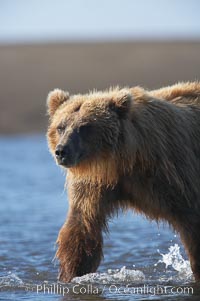
Coastal brown bear forages for salmon returning from the ocean to Silver Salmon Creek. Grizzly bear.
Species: Brown bear, Ursus arctos
Location: Silver Salmon Creek, Lake Clark National Park, Alaska
Image ID: 19167
Species: Brown bear, Ursus arctos
Location: Silver Salmon Creek, Lake Clark National Park, Alaska
Image ID: 19167
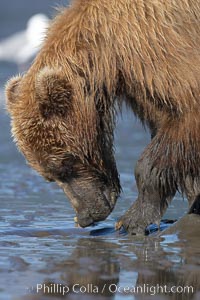
Coastal brown bear forages for razor clams in sand flats at extreme low tide. Grizzly bear.
Species: Brown bear, Ursus arctos
Location: Lake Clark National Park, Alaska
Image ID: 19168
Species: Brown bear, Ursus arctos
Location: Lake Clark National Park, Alaska
Image ID: 19168
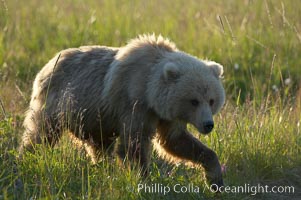
Coastal brown bear (grizzly bear) walks sedge grass meadow near Silver Salmon Creek.
Species: Brown bear, Ursus arctos
Location: Lake Clark National Park, Alaska
Image ID: 19169
Species: Brown bear, Ursus arctos
Location: Lake Clark National Park, Alaska
Image ID: 19169
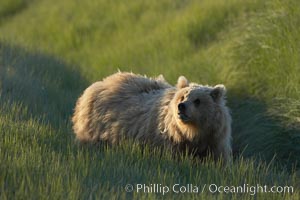
Young coastal brown bear in sedge grass meadow.
Species: Brown bear, Ursus arctos
Location: Lake Clark National Park, Alaska
Image ID: 19170
Species: Brown bear, Ursus arctos
Location: Lake Clark National Park, Alaska
Image ID: 19170
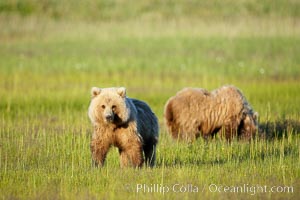
Juvenile brown bears near Johnson River. Before reaching adulthood and competition for mating, it is common for juvenile brown bears to seek one another for companionship after leaving the security of their mothers.
Species: Brown bear, Ursus arctos
Location: Johnson River, Lake Clark National Park, Alaska
Image ID: 19171
Species: Brown bear, Ursus arctos
Location: Johnson River, Lake Clark National Park, Alaska
Image ID: 19171
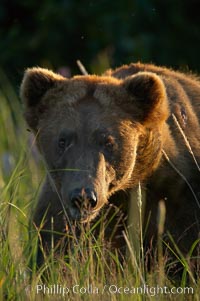
Mature male brown bear boat walks in tall sedge grass.
Species: Brown bear, Ursus arctos
Location: Lake Clark National Park, Alaska
Image ID: 19172
Species: Brown bear, Ursus arctos
Location: Lake Clark National Park, Alaska
Image ID: 19172
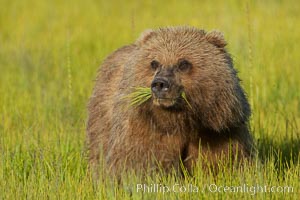
Young brown bear grazes in tall sedge grass. Brown bears can consume 30 lbs of sedge grass daily, waiting weeks until spawning salmon fill the rivers.
Species: Brown bear, Ursus arctos
Location: Lake Clark National Park, Alaska
Image ID: 19173
Species: Brown bear, Ursus arctos
Location: Lake Clark National Park, Alaska
Image ID: 19173
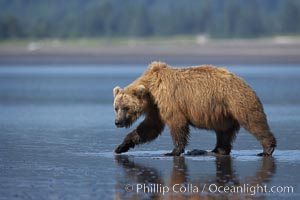
Brown bear walks on tide flats. Grizzly bear.
Species: Brown bear, Ursus arctos
Location: Lake Clark National Park, Alaska
Image ID: 19174
Species: Brown bear, Ursus arctos
Location: Lake Clark National Park, Alaska
Image ID: 19174
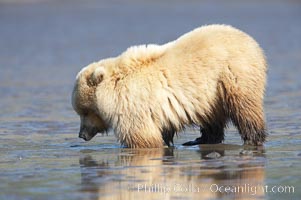
Juvenile female brown bear forages for razor clams in sand flats at extreme low tide. Grizzly bear.
Species: Brown bear, Ursus arctos
Location: Lake Clark National Park, Alaska
Image ID: 19175
Species: Brown bear, Ursus arctos
Location: Lake Clark National Park, Alaska
Image ID: 19175
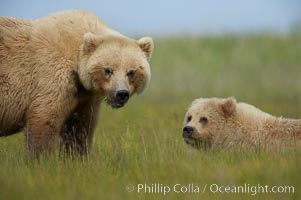
Mother and cub brown bear.
Species: Brown bear, Ursus arctos
Location: Lake Clark National Park, Alaska
Image ID: 19176
Species: Brown bear, Ursus arctos
Location: Lake Clark National Park, Alaska
Image ID: 19176
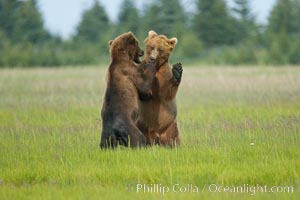
Brown bears fighting or sparring. These are likely young but sexually mature males that are simply mock fighting for practice.
Species: Brown bear, Ursus arctos
Location: Lake Clark National Park, Alaska
Image ID: 19177
Species: Brown bear, Ursus arctos
Location: Lake Clark National Park, Alaska
Image ID: 19177
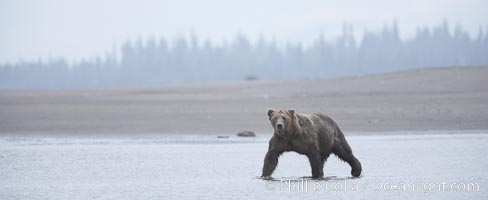
Mature male coastal brown bear boar waits on the tide flats at the mouth of Silver Salmon Creek for salmon to arrive. Grizzly bear.
Species: Brown bear, Ursus arctos
Location: Lake Clark National Park, Alaska
Image ID: 19178
Species: Brown bear, Ursus arctos
Location: Lake Clark National Park, Alaska
Image ID: 19178
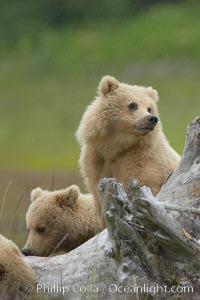
Brown bear cubs. These cubs are one and a half years old and have yet to leave their mother. They will be on their own and have to fend for themselves next summer.
Species: Brown bear, Ursus arctos
Location: Lake Clark National Park, Alaska
Image ID: 19180
Species: Brown bear, Ursus arctos
Location: Lake Clark National Park, Alaska
Image ID: 19180
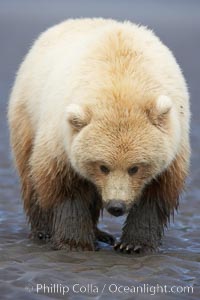
Juvenile female brown bear forages for razor clams in sand flats at extreme low tide. Grizzly bear.
Species: Brown bear, Ursus arctos
Location: Lake Clark National Park, Alaska
Image ID: 19182
Species: Brown bear, Ursus arctos
Location: Lake Clark National Park, Alaska
Image ID: 19182
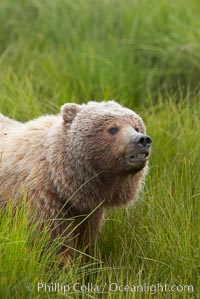
Coastal brown bear in meadow. The tall sedge grasses in this coastal meadow are a food source for brown bears, who may eat 30 lbs of it each day during summer while waiting for their preferred food, salmon, to arrive in the nearby rivers.
Species: Brown bear, Ursus arctos
Location: Lake Clark National Park, Alaska
Image ID: 19183
Species: Brown bear, Ursus arctos
Location: Lake Clark National Park, Alaska
Image ID: 19183